![Joyce Banda having a discussion with John Kerrym US Secretary of State]()
Malawi former president Joyce Banda (JB) on Tuesday met US Secretary of State John Kerry in Boston, United States of America and addressed students at Harvard University on threats to women's leadership, democratisation and the rule of law in Africa.
[caption id="attachment_96035" align="alignright" width="600"]
![John Kerry and Joyce Banda in US]()
John Kerry and Joyce Banda in US[/caption]
[caption id="attachment_96034" align="alignright" width="600"]
![Joyce Banda having a discussion with John Kerrym US Secretary of State]()
Joyce Banda having a discussion with John Kerrym US Secretary of State[/caption]
[caption id="attachment_96038" align="alignright" width="600"]
![Former president of Malawi Joyce Banda addressing Havard University student in United States of America]()
Former president of Malawi Joyce Banda addressing Havard University student in United States of America[/caption]
[caption id="attachment_96036" align="alignright" width="600"]
![Havard University students listening to former Malawi president Joyce Banda]()
Havard University students listening to former Malawi president Joyce Banda[/caption]
[caption id="attachment_96037" align="alignright" width="600"]
![Photo opportunity for Havard University students with Malawi former president Joyce Banda]()
Photo opportunity for Havard University students with Malawi former president Joyce Banda[/caption]
JB’s media assistant Tusekele Mwanyongo said in a statement made available to
Nyasa Times that the former president was in Boston at the invitation of the JFK Jr. Forum, which is part of Harvard University’s John F. Kennedy School of Government, Institute of Politics (IOP).
According to Mwanyongo, the office of the US Secretary of State requested that Banda and Kerry meet when they both addressed students at Harvard University.
Details about the meeting’s agenda are unknown, but the statement says JB told reporters after the meeting that they had “cordial and fruitful discussions.”
Banda then addressed students at Havard Univeristy on challenges and opportunities that aspiring young people and women may face as they seek to take up leadership roles
The JFK Jr. Forum is Harvard’s premier arena for political speech, discussion and debate.
The most important feature of the forum is the requirement that all speakers participate in a question and answer session with members of the audience, a practice that invariably results in lively exchanges..
Recently, the Forum has hosted US Vice President Joe Biden, President Aquino of the Philippines, Barbara Walters, cellist Yo-yo Ma and Dr. Sanjay Gupta, among others.
In her speech, Banda addressed the students on various broad themes covering her tenure, including her experience as a leader; the most important lessons for young people aspiring to become leaders; the place of gender in African leaderships; the structure and functioning of government and whether it is suitable in addressing emerging challenges; and life in a post-presidential role.
Banda also shared with the students events of April 2012 when some officials of the then ruling Democratic Progressive Party (DPP) attempted to block her ascension to the presidency following the sudden death of President Bingu wa Mutharika. She was then State Vice President.
She recounted how she overcame that ‘deadlock’ with the aid of the Malawi Army, the diplomatic community, civil society and the people of Malawi. During that time, the DPP officials allegedly attempted to circumvent constitutional order so that Peter Mutharika, brother to the late president, takes over as President when constitutionally, the Vice President was supposed to step in.
“She also discussed the broader implications of her experience and those of other Heads of States for democratic stability in Africa,” Mwanyongo said.
According to the statement, JB also told the students that Africa has some of the world’s fastest growing economies in the world and that a new crop of African leaders determined to uphold human rights and good governance and fight corruption is emerging.
“There are no military governments in Africa today; Africa has a continental body, the African Union (AU) with a clear mission, mandate and plan for this period all the way to 2063, the next 50 years. AU pays close attention to the emancipation of women with 2015 declared as a ‘Year for Women’ and 2010-2020 as a ‘Decade’ and other special initiatives such as ‘Women in Agriculture’ launched this year.
“AU plays a crucial role in peace-making and peace-keeping wherever there are armed and other conflicts. There are also other regional political, trade and economic blocs fostering closer relations among African states such as the Southern Africa Development Community (SADC), Economic Community of West African States (ECOWAS), East African Community (EAC), among others,” she said.
Furthermore, Banda called on ‘international partners’ to support African leaders who are determined to pursue a “different type of progressive politics and thinking” for Africa to achieve speedy social, economic and political development.
Apart from her speaking engagements at Harvard University, Banda held discussions pertaining to leadership with senior officials who included Maggie Williams, Director of the Institute of Politics,Professor Calestous Juma from the Kennedy School of Government and Lindiwe Mazibuko, Fall 2015 Fellow, Institute of Politics, Harvard University.
Mazibuko, 35, is former Member of Parliament and parliamentary leader for the opposition Democratic Alliance in South Africa.

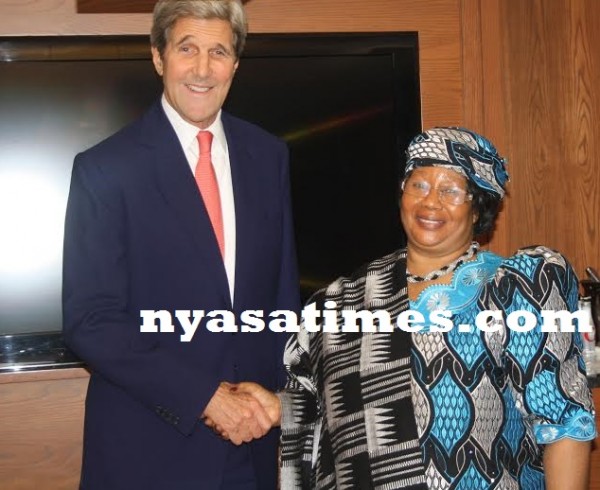 John Kerry and Joyce Banda in US[/caption]
[caption id="attachment_96034" align="alignright" width="600"]
John Kerry and Joyce Banda in US[/caption]
[caption id="attachment_96034" align="alignright" width="600"]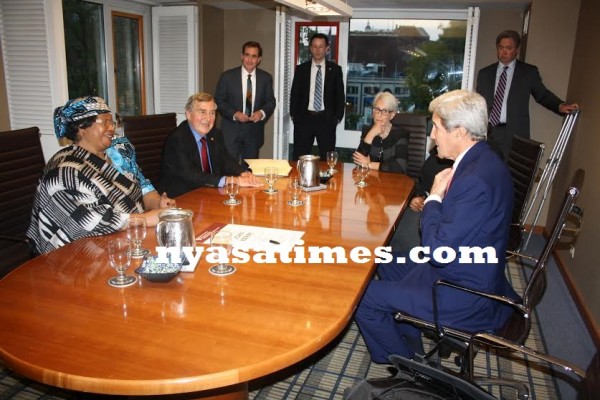 Joyce Banda having a discussion with John Kerrym US Secretary of State[/caption]
[caption id="attachment_96038" align="alignright" width="600"]
Joyce Banda having a discussion with John Kerrym US Secretary of State[/caption]
[caption id="attachment_96038" align="alignright" width="600"]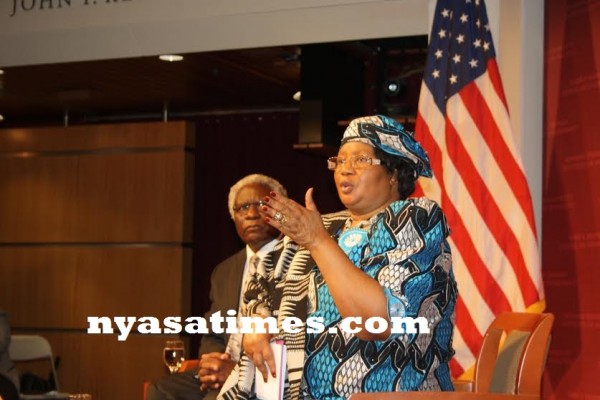 Former president of Malawi Joyce Banda addressing Havard University student in United States of America[/caption]
[caption id="attachment_96036" align="alignright" width="600"]
Former president of Malawi Joyce Banda addressing Havard University student in United States of America[/caption]
[caption id="attachment_96036" align="alignright" width="600"]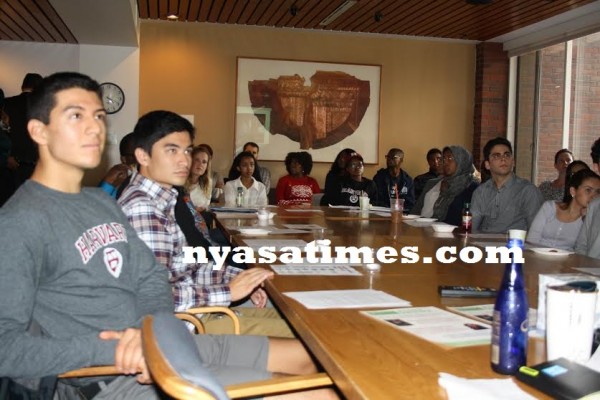 Havard University students listening to former Malawi president Joyce Banda[/caption]
[caption id="attachment_96037" align="alignright" width="600"]
Havard University students listening to former Malawi president Joyce Banda[/caption]
[caption id="attachment_96037" align="alignright" width="600"]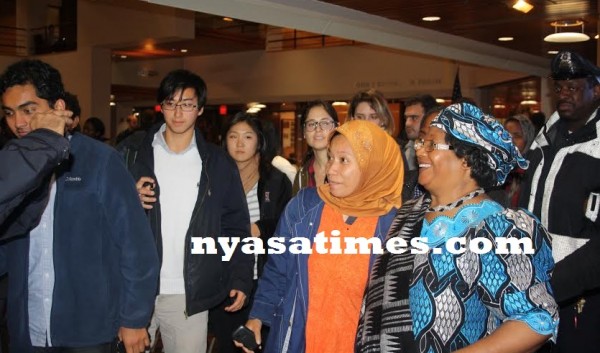 Photo opportunity for Havard University students with Malawi former president Joyce Banda[/caption]
JB’s media assistant Tusekele Mwanyongo said in a statement made available to Nyasa Times that the former president was in Boston at the invitation of the JFK Jr. Forum, which is part of Harvard University’s John F. Kennedy School of Government, Institute of Politics (IOP).
According to Mwanyongo, the office of the US Secretary of State requested that Banda and Kerry meet when they both addressed students at Harvard University.
Details about the meeting’s agenda are unknown, but the statement says JB told reporters after the meeting that they had “cordial and fruitful discussions.”
Banda then addressed students at Havard Univeristy on challenges and opportunities that aspiring young people and women may face as they seek to take up leadership roles
The JFK Jr. Forum is Harvard’s premier arena for political speech, discussion and debate.
The most important feature of the forum is the requirement that all speakers participate in a question and answer session with members of the audience, a practice that invariably results in lively exchanges..
Recently, the Forum has hosted US Vice President Joe Biden, President Aquino of the Philippines, Barbara Walters, cellist Yo-yo Ma and Dr. Sanjay Gupta, among others.
In her speech, Banda addressed the students on various broad themes covering her tenure, including her experience as a leader; the most important lessons for young people aspiring to become leaders; the place of gender in African leaderships; the structure and functioning of government and whether it is suitable in addressing emerging challenges; and life in a post-presidential role.
Banda also shared with the students events of April 2012 when some officials of the then ruling Democratic Progressive Party (DPP) attempted to block her ascension to the presidency following the sudden death of President Bingu wa Mutharika. She was then State Vice President.
She recounted how she overcame that ‘deadlock’ with the aid of the Malawi Army, the diplomatic community, civil society and the people of Malawi. During that time, the DPP officials allegedly attempted to circumvent constitutional order so that Peter Mutharika, brother to the late president, takes over as President when constitutionally, the Vice President was supposed to step in.
“She also discussed the broader implications of her experience and those of other Heads of States for democratic stability in Africa,” Mwanyongo said.
According to the statement, JB also told the students that Africa has some of the world’s fastest growing economies in the world and that a new crop of African leaders determined to uphold human rights and good governance and fight corruption is emerging.
“There are no military governments in Africa today; Africa has a continental body, the African Union (AU) with a clear mission, mandate and plan for this period all the way to 2063, the next 50 years. AU pays close attention to the emancipation of women with 2015 declared as a ‘Year for Women’ and 2010-2020 as a ‘Decade’ and other special initiatives such as ‘Women in Agriculture’ launched this year.
“AU plays a crucial role in peace-making and peace-keeping wherever there are armed and other conflicts. There are also other regional political, trade and economic blocs fostering closer relations among African states such as the Southern Africa Development Community (SADC), Economic Community of West African States (ECOWAS), East African Community (EAC), among others,” she said.
Furthermore, Banda called on ‘international partners’ to support African leaders who are determined to pursue a “different type of progressive politics and thinking” for Africa to achieve speedy social, economic and political development.
Apart from her speaking engagements at Harvard University, Banda held discussions pertaining to leadership with senior officials who included Maggie Williams, Director of the Institute of Politics,Professor Calestous Juma from the Kennedy School of Government and Lindiwe Mazibuko, Fall 2015 Fellow, Institute of Politics, Harvard University.
Mazibuko, 35, is former Member of Parliament and parliamentary leader for the opposition Democratic Alliance in South Africa.
Photo opportunity for Havard University students with Malawi former president Joyce Banda[/caption]
JB’s media assistant Tusekele Mwanyongo said in a statement made available to Nyasa Times that the former president was in Boston at the invitation of the JFK Jr. Forum, which is part of Harvard University’s John F. Kennedy School of Government, Institute of Politics (IOP).
According to Mwanyongo, the office of the US Secretary of State requested that Banda and Kerry meet when they both addressed students at Harvard University.
Details about the meeting’s agenda are unknown, but the statement says JB told reporters after the meeting that they had “cordial and fruitful discussions.”
Banda then addressed students at Havard Univeristy on challenges and opportunities that aspiring young people and women may face as they seek to take up leadership roles
The JFK Jr. Forum is Harvard’s premier arena for political speech, discussion and debate.
The most important feature of the forum is the requirement that all speakers participate in a question and answer session with members of the audience, a practice that invariably results in lively exchanges..
Recently, the Forum has hosted US Vice President Joe Biden, President Aquino of the Philippines, Barbara Walters, cellist Yo-yo Ma and Dr. Sanjay Gupta, among others.
In her speech, Banda addressed the students on various broad themes covering her tenure, including her experience as a leader; the most important lessons for young people aspiring to become leaders; the place of gender in African leaderships; the structure and functioning of government and whether it is suitable in addressing emerging challenges; and life in a post-presidential role.
Banda also shared with the students events of April 2012 when some officials of the then ruling Democratic Progressive Party (DPP) attempted to block her ascension to the presidency following the sudden death of President Bingu wa Mutharika. She was then State Vice President.
She recounted how she overcame that ‘deadlock’ with the aid of the Malawi Army, the diplomatic community, civil society and the people of Malawi. During that time, the DPP officials allegedly attempted to circumvent constitutional order so that Peter Mutharika, brother to the late president, takes over as President when constitutionally, the Vice President was supposed to step in.
“She also discussed the broader implications of her experience and those of other Heads of States for democratic stability in Africa,” Mwanyongo said.
According to the statement, JB also told the students that Africa has some of the world’s fastest growing economies in the world and that a new crop of African leaders determined to uphold human rights and good governance and fight corruption is emerging.
“There are no military governments in Africa today; Africa has a continental body, the African Union (AU) with a clear mission, mandate and plan for this period all the way to 2063, the next 50 years. AU pays close attention to the emancipation of women with 2015 declared as a ‘Year for Women’ and 2010-2020 as a ‘Decade’ and other special initiatives such as ‘Women in Agriculture’ launched this year.
“AU plays a crucial role in peace-making and peace-keeping wherever there are armed and other conflicts. There are also other regional political, trade and economic blocs fostering closer relations among African states such as the Southern Africa Development Community (SADC), Economic Community of West African States (ECOWAS), East African Community (EAC), among others,” she said.
Furthermore, Banda called on ‘international partners’ to support African leaders who are determined to pursue a “different type of progressive politics and thinking” for Africa to achieve speedy social, economic and political development.
Apart from her speaking engagements at Harvard University, Banda held discussions pertaining to leadership with senior officials who included Maggie Williams, Director of the Institute of Politics,Professor Calestous Juma from the Kennedy School of Government and Lindiwe Mazibuko, Fall 2015 Fellow, Institute of Politics, Harvard University.
Mazibuko, 35, is former Member of Parliament and parliamentary leader for the opposition Democratic Alliance in South Africa.